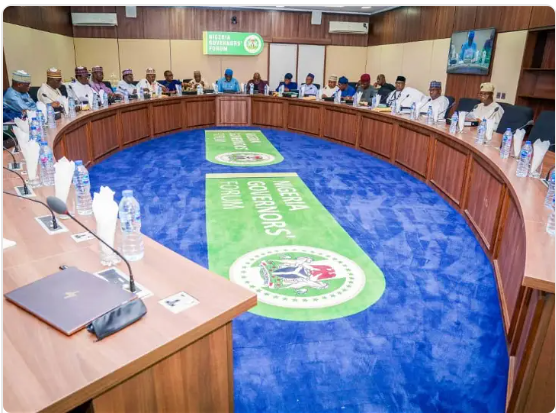
As the nation awaits President Bola Tinubu’s executive bill on new minimum wage to the National Assembly, a host of states may need a bailout or retrench workers to be able to pay the N62,000 being proposed by the Federal Government and Organised Private Sector, OPS.
Although most of the states have been getting more allocations since the removal of the fuel subsidy in May 2023, sources told Vanguard that the increment was paltry and not enough to sustain payment of N62,000 minimum wage.
Meanwhile, the Organised Private Sector, OPS, yesterday said there was nothing like agreement in the just concluded meeting of the Tripartite Committee on the New National Minimum Wage but an alignment of interest.
This is coming as Governor Nasir Idris, of Kebbi State distanced himself from governors who gave hint of inability to pay N62,000 minimum wage.
This is even as Senator Ahmed Wadada, SDP, Nasarawa West, urged President Tinubu to approve at least N150,000 as the new minimum wage.
Currently, no fewer than 20 states are not paying any wage award to their workers to ameliorate the hardship occasioned by fuel subsidy removal, in spite of President Tinubu’s plea to them to emulate the federal government that is paying N35,000, in addition to the N30,000 minimum wage.
Lack of funds
Lack of funds, sources said, was the reason most of the governors are foot-dragging on the new wage negotiations, which they didn’t take active part in.
According to data on federal allocations to states before and after subsidy removal in May 2023, most of the states received between 20 and 25 per cent increment in allocations, while some others conversely, received less allocations.
The states’ gross allocations include revenues from statutory allocation, Value Added Tax, VAT, electronic money transfer levy, EMTL, Exchange Gain, and Augmentations as of when subsidy regime was in place and the non-subsidy regime in 2023.
Paltry increment in allocations
Indeed, the 36 states received N2.188 trillion from January to June 2023 before subsidy removal; and N2.305 trillion from July to December 2023 after subsidy removal. The increment is just N116.79 trillion (five per cent).
Lagos State got a 28 per cent increment in allocation. It got N130.55 billion between January and June 2023, and N167.68 billion between July and December 2023. Anambra’s increment was 16 per cent; Ondo (three per cent), Edo (four per cent), and Imo (13 per cent).
Ondo got N56.5 billion/N58.2 billion. Anambra was N46.6billion/N53.6 billion; Edo N57.5 billion/N49.97 billion; and Imo N47.08 billion/N53.4 billion.
States that received less allocation after subsidy removal were Akwa Ibom (33 per cent), Delta (26 per cent), Bayelsa (20 per cent), and Rivers (12 per cent). Akwa Ibom got N185.6 billion before subsidy removal and N125.3 billion after. Bayelsa received N138.6 billion/N110.9 billion. Delta got N244.6 billion/N180.7 billion; and Rivers received N173.6 billion/N153.1 billion.
Akwa Ibom, Bayelsa, Delta and Rivers states received more allocation at the first half of the year when compared to the second half of the year of non-subsidy regime due to increase in the 13% derivation at the first half of the year and reduction in 13% derivation at the second half of the year.
Why states may have issues paying
Arguing that most states would have issues paying N62,000 as minimum wage, a governor said: The issue is not about the Federal Government, which Labour makes it look. What is being negotiated is a national minimum wage, not a federal government minimum wage for its workers.
“A national minimum wage affects states, local governments and private sector employers, especially SMEs and MSMEs. The first consideration in wage negotiation is affordability and ability to pay. Can states, local governments and private sector employers afford to pay?
“It means states and local governments will spend all their federal allocation and internally generated revenue and even borrow to pay their workers who are less than one per cent of their population. What will they spend on the rest of the citizens in the 36 states who need education, good roads, healthcare, security etc?
“There is need to consider the consequences on the economy, inflationary trend and possible layoff of workers if NLC/TUC blackmailed the government to agree on a minimum wage that is not realistic and sustainable.
‘’There is a general consensus that minimum wage should be increased but it has to be within a realistic band of what all parties can pay. That is why the private sector and government are offering N60,000.”
Idris distances self from unwilling govs
However, Kebbi State governor, Idris, in an interview with the British Broadcasting Corporation, BBC, said he was not aware of any meeting where governors made their stand known on the disputed N62,000 minimum wage.
The former unionist wondered when the meeting was held because he is a member of the negotiating committee and had been mediating between the federal government and organised labour on the minimum wage issue.
“I was not part of the meeting if it was even held and I will not be part of those who will not pay the agreed minimum wage. Like I did say at different public fora that I will pay the agreed amount, I stand by that.” he said.
He explained that, as a crusader for workers welfare and better pay, he would not abandon his people in these trying times, adding “as a member of the tripartite committee, I will continue to negotiate in favour of Nigerian workers.”
While urging both the federal government and organised labour to shift grounds to reach a common, acceptable and sustainable living wage, he pledged to implement the agreed sum to Kebbi workers.